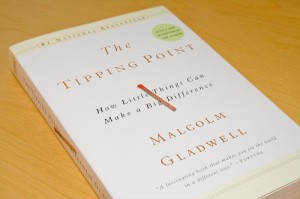 Have you ever wondered what makes one community shine while others remain unremarkable? Why do some towns become destinations and others do not? Doubtless this kind of success is the result of many years’ work by leaders and citizens, but there is usually an identifiable moment in time when the energy ignites – something Malcolm Gladwell describes so well in his book The Tipping Point as “that magic moment an idea, trend, or social behavior crosses a threshold, tips, and spreads like wildfire.” Greenwood has come a long way since its incorporation in 1864. Our heritage is present in the architecture of Old Town and we can boast shopping districts both quaint and modern. Our residents enjoy a great educational system, libraries, and parks. But sometimes it still feels as though we could “tip” either way.
Have you ever wondered what makes one community shine while others remain unremarkable? Why do some towns become destinations and others do not? Doubtless this kind of success is the result of many years’ work by leaders and citizens, but there is usually an identifiable moment in time when the energy ignites – something Malcolm Gladwell describes so well in his book The Tipping Point as “that magic moment an idea, trend, or social behavior crosses a threshold, tips, and spreads like wildfire.” Greenwood has come a long way since its incorporation in 1864. Our heritage is present in the architecture of Old Town and we can boast shopping districts both quaint and modern. Our residents enjoy a great educational system, libraries, and parks. But sometimes it still feels as though we could “tip” either way.
The factors that tip a community toward success are numerous, but many citizens assume that complete responsibility for their city’s success rests in the hands of elected officials, and that their own role is limited to Election Day. But the true power of a community to succeed or to fail has always been found in the opinionated, passionate, and diverse voices of its people – not merely in protest or campaign, but in conversation.
At the library, we realized that we were not putting a high enough priority on being a part of the conversation in our community. So we made a plan. First we began taking our monthly management team meetings on the road. We visited local schools and other organizations, heard about their work in our neighborhoods, and got to know them a little bit better. We’ve been to a fire station, several schools, a non-profit organization, and a community foundation, among others. With every tour we feel more connected to our community and have truly been inspired by the people we meet and the work they do.
Next, we began attending every City Council meeting. One of our management team members attends each meeting and reports back. We are learning about our community and can witness laws being created and revenue being managed. We have seen citizens come forward to speak passionately to the council – either in support or protest – and have their voices heard. One of our team members put it this way, “The public should have a voice, and it was pretty cool to see it happen in reality.” Sometimes those who voice their opinions find the resolutions they seek and sometimes they do not, but without their presence the conversation can’t be complete. It is true that some meetings are more interesting than others, and that most of the agenda items do not directly impact the library, but our presence is a statement of our organization’s commitment to the conversation.
We have noticed that citizens who come to speak to the council usually leave as soon as their agenda items are addressed. But there are a few citizens who attend each meeting with no agenda except to learn and to be a part of the conversation. I should not have been surprised to find these community advocates in attendance. I have met many people like them as I’ve gotten to know Greenwood. These are the individuals who volunteer their time to make a difference. I see them at the library, on local boards, or serving with local community organizations. They truly are Greenwood’s heroes, but they may be even more than that. They may be a part of the tipping point Greenwood has been waiting for.
Whether you are an individual citizen, a business owner, or the leader of a non-profit organization, I encourage you to consider how you might become a bigger part of the conversation in your community. We can’t let a challenging economy, crime, and indifference tip the scales the other way. Whether you agree or disagree with the current course your city is on, be a part of the story. Check out The Tipping Point: How Little Things Can Make a Big Difference by Malcolm Gladwell (at your local library) and be inspired by the possibilities.
